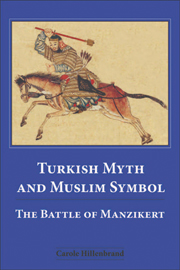Book contents
- Frontmatter
- Contents
- List of figures
- List of plates
- Acknowledgements
- Comment on transliteration and conventions used in the book
- Dedication
- Part 1 Medieval Muslim interpretations of the battle of Manzikert
- 1 Introduction
- 2 The twelfth-century accounts of the battle of Manzikert
- 3 The thirteenth-century accounts of the battle of Manzikert
- 4 The fourteenth- and fifteenth-century accounts of the battle of Manzikert
- 5 Writing the battle
- Part 2 The legacy of the battle
- Conclusion
- Appendix A The account of the battle of Manzikert by Michael Attaleiates, translated by Ruth Macrides
- Appendix B Translations of some other medieval Christian accounts of the battle of Manzikert
- Appendix C Other medieval Muslim accounts of the battle of Manzikert
- Bibliography
- Index
- Plate section
5 - Writing the battle
from Part 1 - Medieval Muslim interpretations of the battle of Manzikert
Published online by Cambridge University Press: 05 August 2013
- Frontmatter
- Contents
- List of figures
- List of plates
- Acknowledgements
- Comment on transliteration and conventions used in the book
- Dedication
- Part 1 Medieval Muslim interpretations of the battle of Manzikert
- 1 Introduction
- 2 The twelfth-century accounts of the battle of Manzikert
- 3 The thirteenth-century accounts of the battle of Manzikert
- 4 The fourteenth- and fifteenth-century accounts of the battle of Manzikert
- 5 Writing the battle
- Part 2 The legacy of the battle
- Conclusion
- Appendix A The account of the battle of Manzikert by Michael Attaleiates, translated by Ruth Macrides
- Appendix B Translations of some other medieval Christian accounts of the battle of Manzikert
- Appendix C Other medieval Muslim accounts of the battle of Manzikert
- Bibliography
- Index
- Plate section
Summary
(Alp Arslan said): ‘Today God (to Him be power and glory) has favoured the Turks and given them dominion because they are orthodox Muslims and do not tolerate vanity and heresy.’
Introduction
The nature of Islamic history
From classical times onwards, history has been used not only to entertain but also to teach important moral, religious and political truths. Thucydides, for example, was constantly drawn away from events to some lesson that lurks behind them, to an unchanging and eternal truth. Islamic historical writing is unashamedly didactic. It teaches lessons through recurring patterns of events. It is a God-centred model of history and His will is done through chosen élite individuals. Medieval Muslims wrote exemplary history with the twin aims of edification and entertainment.
In previous generations, scholars were concerned to examine how ‘reliable’ medieval Muslim sources might be, in order to establish ‘verifiable facts’. This is, of course, a valid point of view. More recently, however, the importance of the rhetorical nature of Islamic historiography has received greater prominence. Hayden White spoke of a poetics of historical writing, and Waldmann and Meisami blazed a trail in this respect in the field of medieval Persian historical writing. But there is much more to be said on this matter, especially in connection with Arabic historiography, and the medieval Arabic and Persian narratives about Manzikert present an ideal opportunity to shed at least some light on their considerable literary value.
- Type
- Chapter
- Information
- Turkish Myth and Muslim SymbolThe Battle of Manzikert, pp. 111 - 144Publisher: Edinburgh University PressPrint publication year: 2007



